So, another year has passed, and we all know what that means: another Top Films list. Another recount of the rules. This is all the films I saw between January 1st and December 31st, that were first released to a wide audience. If a film came out in a festival in 2016, but only came out to general audiences in 2017, it counts. Sadly this means that some awards contenders will not be on, since those don't come here until January. Once again, these are only films that I saw this year. My list once goes from the worst film I saw at the very beginning, and the films improve in quality until we reach the best film of the year. So without further ado....
I watched this in February, and I just knew that nothing could possibly beat it out as worst of the year. 10 months later, and despite at least one close contender, that prediction has held out. This does everything wrong. Its story relies on a number of contrivances and doesn't hold up under scrutiny. Its lead is dull and bland, and lacks consistent (or any) characterization, as don't any of the other characters. It is shot like a commercial or a low-budget PSA. It is not remotely memorable or interesting in any way. I don't quite know how else to describe it. It is really bad, in ways at times I can't even describe. Not for spoilers, but you might not believe me.
You'll be happy (or indifferent) to know that this finally garnered enough reviews to have a Rotten Tomatoes score of 0%. (One may call it the anti-
. I already laid into this film pretty harshly, and even then, I might have been too kind on it. You really have to see this to understand how botched the whole thing is. (Do not see this, I'm merely illustrating a point). The choices made both with the filmmakers and the characters within the film are bizarre and inexplicable. It comes off like a mixture of a Lifetime movie and an old ABC Afterschool Special, with a bit of an added white savior narrative to boot. It is strange, in most awful way possible.
Even if you take the anime out of this, what you get is a really boring, pretentious, and overall forgettable film. It is everything bad about modern blockbusters, from its over-use of CGI, its misuse of an iconic source material, and especially its dull action. The worst part was that, while it took various parts of the anime and manga (most of which I hadn't seen), it clearly didn't adopt any of themes of technology or memory or intelligence that were present in the original franchise, yet it still expects that its surface level exploration of these topics are sufficient enough. It also is incredibly boring, and like I said in my review, I almost fell asleep watching it. I suppose it's good for insomniacs.
Life
.png)
You know what really sinks this film? Not that it was just a generic creature feature that thought itself some deep meditation on extraterrestrial life, but it was a bad creature feature. One with dumb characters, a very generic looking alien, a distinct lack of tension or horror, and a really obvious twist ending (paired with a very odd song choice for the ending credits.) How this Syfy original movie came out with an all-star cast in theaters is beyond me. In a year of decent horror, this is the stand out in terrible.
American Assassin
Okay, I checked, the book this was based on was written in 2010. Odd, considering this feels like something made in 2006. This film definitely wears its Tom Clancy-lite origins proudly, I'll say that. I'd actually might have had some deeper problems with the narrative, had it not also been incredibly boring and confusing. The lead, uh...Dylan O'Brien lacks charisma or any definable personality, Michael Keaton is mostly wasted, and I frankly can't tell you a single thing that happens in this. Not because I can't remember, but even sitting there in the theater, I couldn't tell you what happens in it. Or that I actually cared.
A Cure For Wellness
This might be the controversial choice, but frankly, I hated this movie. It is nearly 2 and a half hours, but nothing is really accomplished. The narrative constantly changes, it's incredibly inconsistent, the scary imagery adds nothing, I can barely remember what happens in it. This felt pointless. Nothing actually mattered, and there wasn't anything to make you care about what is happening. The only thing keeping this high is that I saw this on an airplane, which is probably the most appropriate setting to watch this.
Meh
Justice League
Like I said, it's better than its two predecessors, which actually makes it less interesting. I feel that, if I were to talk about the specific problems of this film, I would be repeating myself from either earlier in the list or my own review of this. Really, it's exactly what most people were expecting. A overwrought, ugly looking film that Warner Bros had tried to salvage and ended up making it far worse. After the promise that Wonder Woman showed, that was the true disappointment. But, it made its money back, so we might be getting more of these. To leave on a note of optimism, maybe they'll learn their lesson. (Or not, given the DCEU track record.)
Downsizing
 |
| Source:https://i0.wp.com/teaser-trailer.com/wp-content/uploads/Downsizing-movie-poster.jpg?ssl=1 |
This goes into the category of "wasted potential". This was a high concept science fiction satire, directed by Alexander Payne. A recipe for a potentially great film. What we get is middling at best. It doesn't seem to find much of a plot, instead going from non-sequitur to non-sequitur. We learn nothing about the character we're following, the downsizing process is underutilized, and the lesson feels tacked on, and not what the film was building up to. A real disappointment from Payne, who was known for smart, interesting commentary in previous films, but really comes up short here.
Free Fire
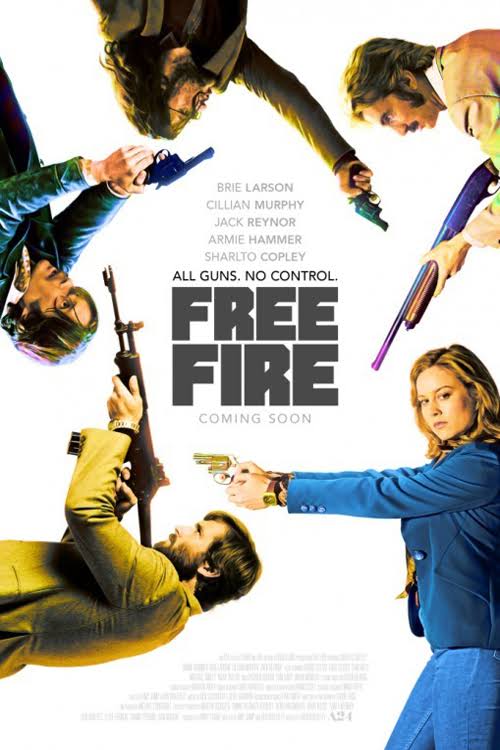 |
| Source:http://t3.gstatic.com/images?q=tbn:ANd9GcSQkl_myF0IWyWS1g2GHLP7qiKJuYNvPpUg-XxYa17XJyG7ECig |
I wavered a bit on this, whether it belongs here or in the okay category, because there are decent things about it (the conceit of an action film set entirely in one location, some of the action scenes and the sound and acting choices, which make it a little more realistic). However, what put it here was my own lack of enjoyment. One sign that I didn't like this was that I couldn't remember any of the character's names. Not just now, while I was watching the film. There's a big twist at the end, which didn't work, because it involved a named character, who I didn't know. That stems from all the characters basically being the same person. They have no distinct personalities, other than ostentatious clothing and swearing a lot. Because these characters aren't distinct or memorable in any way, I had a hard time caring when the action started. The action is confusing, and you only have a vague sense of what's happening, which I think was the point. The problem is that I didn't care, because these characters were not interesting, and frankly, seeing someone crawl because they got shot, while novel at first, got really old really fast. I've heard this director's other work is good, but this probably isn't one of them.
Suburbicon
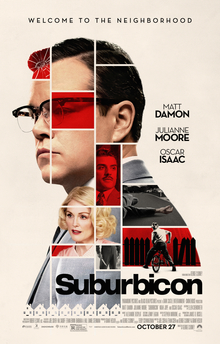
Did you know this movie had a major subplot about a black family moving into the titular all-white Suburbicon? No? That's because the trailers don't show it, meaning the marketing clearly saw what everyone else did. The integration plot is very awkwardly juxtaposed with the Matt Damon-Julianne Moore plot, they have virtually nothing to do with each other, and they rarely interact. Would it surprise you to learn that this is actually two scripts, one by the Coen Brothers and one by George Clooney and a writing associate, mushed together like Playdo by Clooney. It is just as bizarre as it sounds. The reason it is this high, is that, while it is a definite failure, the sheer scale of this failure is sort of spectacular. This movie was given every opportunity to succeed, with such talent involved ( George Clooney's previous films as director were decent), but it's a complete disaster. It's like if Tommy Wiseau tried to direct a movie about the ills of the 1950's. It's terrible, but it's fascinating in its terribleness.
Okay
The Hitman's Bodyguard
The only thing keeping this off the "meh" list was that it was funny enough. Ryan Reynolds and Samuel Jackson have good chemistry, and they and Selma Hayek have the funniest lines in the film. The problem is that everything else in the film is done very poorly. The action is comparable to Die Hard 5 in its incomprehensibility, and it has severe tonal shifts, from the wacky antics of Reynolds and Jackson to fairly graphic scenes involving Gary Oldman's Belarusian dictator. The plot got a bit convoluted. It might not have an actual good movie, but it is humorous enough that I enjoyed it.
Kingsman: The Golden Circle
As someone who really loved the first film, this was quite a disappointment in comparison. Still, in spite of the stalled narrative and the feeling of repetition, I did find enjoyment in this film, and the big action scenes were entertaining. That, and a pretty funny Elton John cameo, were enough to leave this off the bad side of the list. It's not really that disappointing a sequel, but it was still lackluster.
Molly's Game
Another one I wavered a bit on as to whether or not it belonged here or in "meh". I ultimately enjoyed this film, so it came here. Despite its flaws (the occasional Sorkinism, the overlong explanations trying to be "The Big Sick", the overuse of narration and dialogue to convey character traits that should be shown), ultimately, Jessica Chastain and Idris Elba are able to salvage this, and the story is very entertaining. How much of it is true, I can't say, but you know, artistic license and all that. Frankly, my biggest fear (Sorkin unedited is also the preachiest Sorkin) was unfounded aside from two scenes, and he actually is able to convey the story without getting bogged down in its own minutia.
American Made
I may have said this before, but I've grown more or less tired of this genre of "guy gets rich off criminal activity, enjoys the spoils, ends with him getting screwed". The problem is how similar these films end up feeling to each other. It's the same story, it's filmed similarly, there are archetypes. This is basically that kind of film, and it's not particularly unique among those films. However, it does have the benefit of Doug Liman (The Bourne Identity, Edge of Tomorrow) directing and Tom Cruise once again giving his all. There are some really good flying scenes, and some history behind the 80's drug boom and the CIA's activities in Central and South America during the 80's (even if Barry Seal's involvement in the latter is dubious in terms of accuracy). Of an increasingly tired and cliched genre, this was probably the most tolerable one I've seen in years.
Going in Style
I wasn't the target audience for this, and I haven't seen the original 1979 film. That said, this was decent enough. The three leads are all hilarious in their own way, are all developed characters, and the plot is interesting in the turns that it takes. I watched it with my dad, who had seen the 1979 film, and he seemed to enjoyed it. I think this is a nice family film for people to watch on a lazy Saturday. I can't say I'll ever watch it again, except in the background.
All the Money in the World
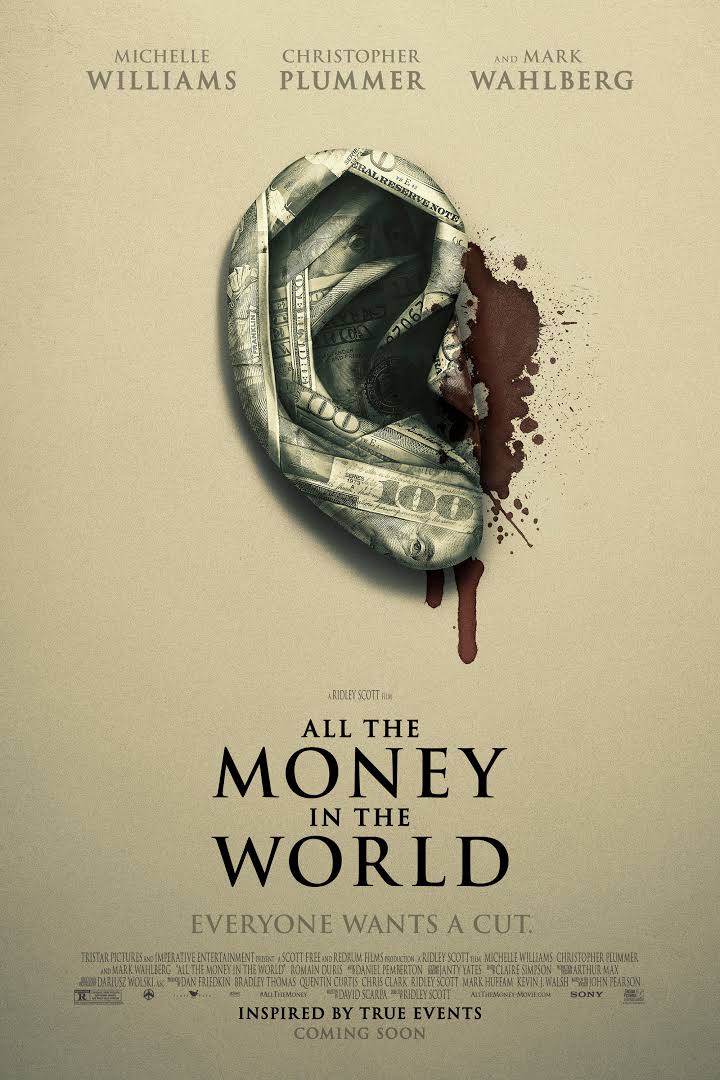 |
| http://t3.gstatic.com/images?q=tbn:ANd9GcRWPRvrJToDBRlmAZA2joRqJhI1ffxvR-Fp3_hfzCPW-8RG7pV6 |
I admit, I wasn't particularly interested in this film, before the whole announcement that Kevin Spacey was to be completely erased from this picture, and replaced with Christopher Plummer, and still get to the release date. A month before that date. After that, I knew I had to see if that could be pulled off. Having now seen the film, on that front, it is seamless. There is no indication that Kevin Spacey was in the film, and Plummer is placed smoothly in the narrative. Plummer is also great in the role, which he completely disappears into, and has gravitas. The rest of the film around it is fine. Good performances from Michelle Williams and Marky Mark, some good tension, and character dynamics. It's fine, mostly, and I enjoyed watching it, but I probably won't be revisiting it any time soon.
The Foreigner
Again, fine. Good turn from Jackie Chan and Pierce Brosnan. A decent, if somewhat outdated, plot with Chan trying to find the IRA members responsible for the bombing that killed his daughter, and Brosnan also trying to get to the bottom of it. Some intense action scenes and some good turns of the plot. Not particularly memorable, but one I could see watching again at some point.
Atomic Blonde
 |
| Source:https://static.rogerebert.com/uploads/movie/movie_poster/atomic-blonde-2017/large_kV9R5h0Yct1kR8Hf8sJ1nX0Vz4x.jpg |
You know, the title of this film doesn't make any sense once you've seen the film, considering nuclear weapons don't really factor into the plot. (The Coldest City, the title of the comic it's based off, makes more sense). Regardless, this is very style-over-substance, but in a good example of the genre. Unlike Suicide Squad , the strange editing and tone are actually consistent and work throughout the film. It also has some pretty stylish and unique action to it, which make it stand out. It's plot is incredibly convoluted, yet very predictable, and has that ending that never ends, unfortunately, so I can't fully recommend. Still, it was fun, and I admit, I wouldn't mind seeing it again.
Good
The Big Sick
This is a small movie. It primarily focuses on the real life story of comedian Kumal Nanjiani dealing with his girlfriend Emily's coma. It does a fairly good job of showing it, particularly with Kumal's interactions with his own family (and the secret he was dating a non-Pakistani), and his dealings with Emily's parents as they all deal with Emily's Coma. The film primarily works as a nice little story, populated by likeable characters, and imbued with a sincerity and charm to it, one which only increases when you realize it is a true story.
Spider-Man: Homecoming
I've been a big Spider-Man fan for a very long time, so I was excited for his entry to the MCU. This was a pretty good introduction to this version of the character. For one, since this character has frequently recited origin, this is not an origin story, but instead a "day in the life" of Spider-Man as he adapts to suddenly being associated with Tony Stark and the Avengers. That was refreshing, and it largely stands as a good film in its own right. That said, it really isn't particularly outstanding in the MCU, nor was it even the best Marvel film of the year. It was merely good.
Kong: Skull Island
Well, at least, it's title is honest: Kong actually appears in this film for more than 15 minutes. That's one thing it has over Godzilla. While not as good as the 1933 or 2005 versions, this still manages to carve a unique niche in terms of the character, with its early 1970's setting, and its Kong more inspired by the Japanese Kaiju version of the character. It also has some pretty good characters to follow in scenes that don't feature Kong, including good turns from Samuel Jackson and John C. Reilly. After the disappointment of Godzilla, this shows that maybe there is life in this franchise after all.
War for the Planet of the Apes
In comparison to the other two films, this wasn't as good as those, but this is still pretty good nonetheless. A strong narrative that focuses on war, what life is like under it, and the extreme actions taken during it, it is intelligent, compelling, and very tragic in its dealings. It also expands on the ideas introduced in the previous films, and uses them as the foundations for the society that will eventually be depicted in Planet of the Apes. These are helped by great performances by Andy Serkis and Woody Harrelson, and some excellent effects and action scenes. It is an overall thrilling experience.
Murder on the Orient Express
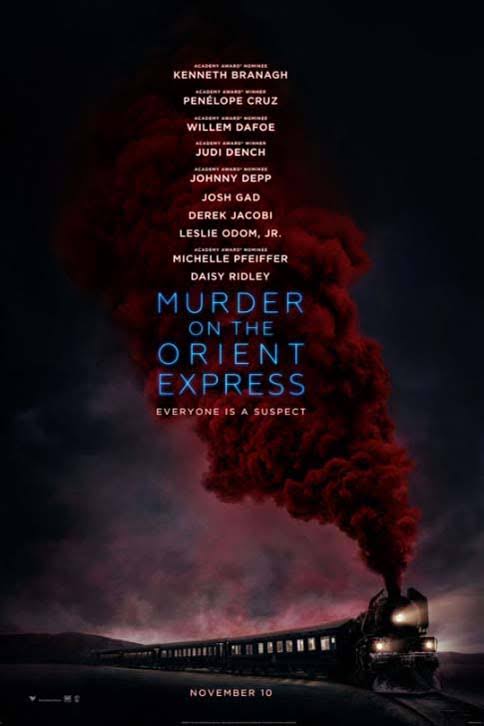 |
| Source:http://t3.gstatic.com/images?q=tbn:ANd9GcQhN5N8AjbsRwE-PkDpWkpfWv5nF7KvTyXAm39-mQ8qnvhbtTDX |
Having not had any particular familiarity with this book (having only read a summary in preparation for watching this) I can't speak to the accuracy of this film. I can say this was entertaining. All the actors are great in this, especially Kenneth Branagh as Hercule Poirot. It has some good period dressing, and the build-up to the final solution is well-executed. I could tell when things were changed (namely, superfluous action scenes), but it mostly works, at least for someone who hadn't read the book, like myself.
Star Wars: The Last Jedi
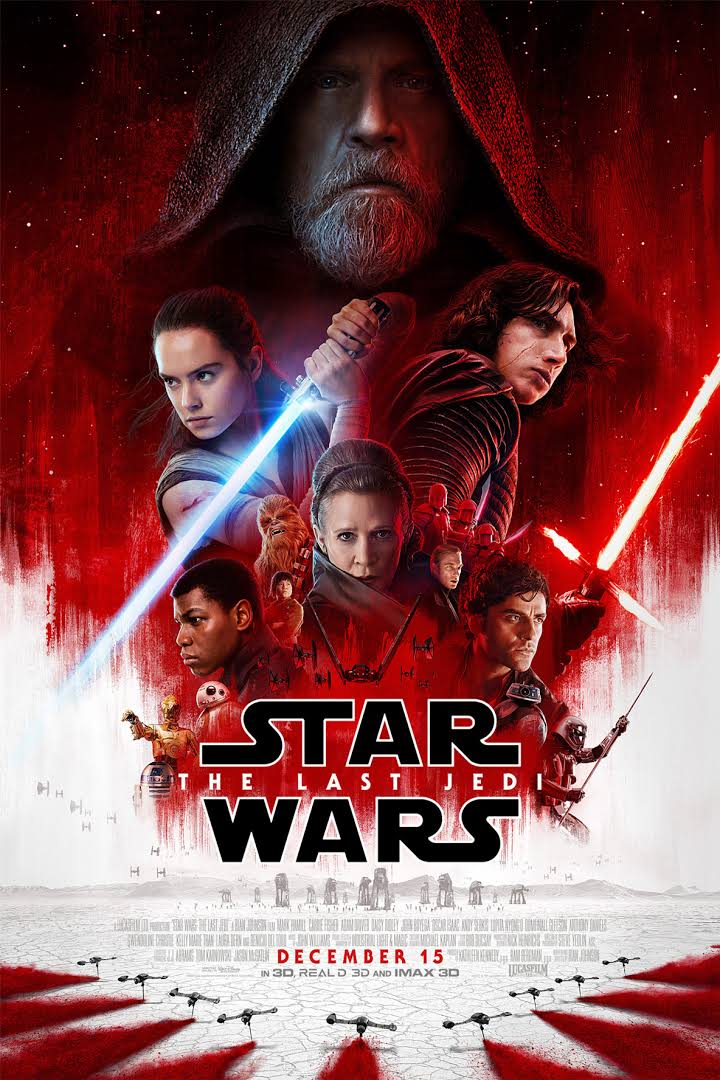 |
| Source:http://t2.gstatic.com/images?q=tbn:ANd9GcRgcIU4MKHZkZNeDt_tAewyfwX7PAmSdj_7wdg_FInkZw8Um9F_ |
This is very much the
Empire Strikes Back to
Force Awaken's New Hope. As such, it is a better film, and a lot more original, both in terms of plot and world building. While fan-service is still there, there is still a legitimately good plot and characters to go along with it, and we see how these characters progress and have changed since the last movie. It also is very tragic, in regards to some beloved figures, both in-universe and in real life. My only criticism is that it was a bit too long, but overall, I found that this was a good film. Since
Return of the Jedi was also good, I have a feeling the third one of these might end the trilogy on a high note.
Thor: Ragnarok
I liked the visual style of this film. Very 70's, sort of Heavy Metal in terms of design. The humor, while a bit much, was good, and I really liked Tessa Thompson, and especially Cate Blanchett as the villain. I also liked the subtext of the relationship between peoples, societies, and violence. It gives you a lot to think about, and the ending was especially nice and poignant. A nice lead-in for Infinity War.
It Comes At Night
This was a tad slow towards the beginning, and the conceit that the audience knows as much as the characters do about the situation perhaps worked better on paper, than it does on film. However, this film was chilling enough for it to work. I was gripped for every last second, and the ending is haunting, especially when it builds on the ideas that the film introduced. It's the sort of film that still gives me chills sitting here writing about it.
Logan
 |
| Source:https://images-na.ssl-images-amazon.com/images/M/MV5BMjQwODQwNTg4OV5BMl5BanBnXkFtZTgwMTk4MTAzMjI@._V1_UX182_CR0,0,182,268_AL_.jpg |
I will not contest the idea that this was a pretty great film. Jackman's final turn as Wolverine shows the actor and character at his most vulnerable, showing the torment and anguish he has suffered through the years with the destruction of the X-Men and the slow extinction of mutants, and how that affects his relationship with what I think is supposed to X-23 (the young female clone of Wolverine in the comics). Patrick Stewart, in his own last turn as Professor X, is fantastic, and he shows why he was so great in this role to begin with. The rustic setting and dark tone are very invocative of where the film is going to go. I do have trouble seeing it as one of the best superhero films of all time (given that other superhero films have also shown this ground). However, I see why others love it, and I really love it too. It is a very fitting final act for these versions of Wolverine and Professor X.
Dunkirk
 |
| Source:http://www.pieuvre.ca/wp-content/uploads/2017/08/Dunkirk.jpg |
Aside from the somewhat odd transitions and the sound mixing which makes it a tad hard to hear at times, this was ultimately an intense, interesting experience. Showing three stories set within the Dunkirk evacuation during World War II, it is able to convey these stories with minimal dialogue, while displaying a wide array of emotions and motivations. As someone not into war films, this was a war film that hooked me in. Its scale is so massive, yet it also has a very personal touch to it. This probably one of Nolan's best.
Logan Lucky
This Oceans- style heist film featuring lower class West Virginians attempting a heist of the Charlotte Motor Speedway could've easily become a put-down and condemnation of the region and its people. However, director Steven Sodebergh (a Southerner himself by origin) manages to make the audience feel empathy for the characters and their plight, by showing the kinds of problems that they deal with on a regular basis, and why something like this is attempted. It also shows genuine affection for its characters and portrays them as extremely skilled and clever in their own. The heist itself is very elaborate and well done, and the ending is pretty happy, all things considered. Even if the elements of the plot turn you off, this will actually somehow win you over.
The Void
You can tell how heavily John Carpenter influenced this film. From the Lovecraftian themes to the disturbing imagery to the synth heavy score, this is very clearly influenced by John Carpenter. It works, in that sense. While a bit confusing, and the imagery a bit too much, this is a decent enough riff on Lovecraftian horror, with enough existential dread and cult activity to satisfy dedicated Cthulhu enthusiasts and enough blood and scares to satisfy other horror fans. I could certainly seen this gaining a following in the former circles.
Blade Runner 2049
The failure of this was a real surprise to me, given how iconic the original is, and influential and homaged it has become. Then again, the original was actually not very successful at the box office, so maybe this franchise isn't as popular as imagined. Nevertheless, the film is an achievement in its own right. Denis Villeneuve was able to honor the original, without copying it, and build up the universe and its own original story. It works even if you've never seen or know anything about the original. It's universe is unique and alive, and very alien, yet familiar, helping with the franchises themes of real and "fake" life in the form of the replicants. A shame not many people saw it.
The Disaster Artist

The Room is a film with not so much as a plot, as a sequence of non-sequiturs and odd filmmaking choices, and the interactions between characters don't resemble that of regular beings. The Disaster Artist by Greg Stestero (who played Mark in the film) was about the making of the film and the bizarre auteur behind it, a mysterious man by the name of Tommy Wiseau. I read the book, and I admit, I was a tad disappointed that the more insane episode from the book weren't featured in this. That said, this was probably the best adaptation anyone could ask for, managing to capture the insanity of the making of this film, and Tommy Wiseau's unstable nature. James Franco is great, capturing the mannerisms and voice of Wiseau perfectly, to the point where you stop seeing Franco, and start seeing Wiseau. It also explores why the Room is so enduring (a bit too much at times, but that's not here or now), and very piously recreates the footage from the film. For Room fans and non-fans, it is a must-watch.
It
This was a surprise. Another adaptation of Stephen King (the first from 1990), I didn't know what exactly to expect (maybe a Stranger Things rip-off). What I got was the scariest film I saw in theaters this year. It is intense, and unrelenting in its scares, barely letting you breath before the next scene. It was exasperating. There were flaws, incredibly jarring tonal shifts, and a villain that got sillier and unintentionally funny as the film went on, but those were overrided by the sheer terror of this film. Hopefully the sequel captures that essence well.
The Lego Batman Movie
The film that finally got me to tolerate Batman again. While not as good or funny as The Lego Movie, it is still funny, creative, and surprisingly heartfelt. It lampoons Batman and his universe, while paying homage to the character 80 years of history. It also is a nice story about Batman finding a new family. Certainly, a treat for both Batman fans and non-fans alike. And the song at the end is pretty good too.
Wonder Woman
All this had to be was better than Batman v. Superman., The fact it ended up as good as it did is nothing short of a miracle. This is the first DCEU film that actually captures what the character truly fought for, and is a good representation of it on film. WW is also the most heroic of any of the heroes in the DCEU so far. It has an good plot that utilize and challenge Diana's values, and show off both her powers and her compassion for others. And unlike other people, I actually did like the villain, and the eventual twist. A sign that maybe DC was getting... and then Justice League happened.
John Wick Chapter 2
This is the best kind of sequel in that it takes what worked about the original, and expands on it. It basically is more of Keanu Reeves doing elaborate shoot-outs and fights, but in a good way. The film has larger scale fights, a larger international plot and settings, and a larger ending. However, it still has the essential elements that made the first one work. The narrative is very tight and well-paced, the shots are stylish, the action is almost poetic, and the universe is intricate and elaborate. Here's hoping John Wick 3 is as good.
Baby Driver
Edgar Wright manages to take his signature style and flair, and easily applies it to a more straight-forward action film. The film manages to combine Wright's editing with a great soundtrack, which the film actually integrates into the shots and action happening on screen, and a good tribute to old heist and gang movies. Ansel Elgort does well as our hero, and despite being mostly silent, is able to convey a lot of emotion and character. The action is memorable, and the characters each have their moment. I can't say this is Wright's best, but it's right up there. (Though the presence of Kevin Spacey might make it a bit awkward to watch now.)
Coco
_poster.jpg)
Every time Pixar seems at its lowest (Cars III, which I skipped, came out this year as well), it always finds a way to come out on top. I knew this would be this high when I cried twice during its run time. While the story is a little predictable, it manages to be very poignant with its themes of family and the power of music, as well as staffed with very interesting, memorable characters. This is also one of the most beautiful films Pixar has ever released, with bright colors and unique designs on every corner. While the comparison to Book of Life is inevitable, given their shared themes of Dios de la Muertos and music, this film is very distinct from that one, both in terms of its design, its plot, and especially its strong message about family (which, according to some Mexican viewers, is more resonant with Mexican values than Book of Life's follow your dreams angle). While I may not know much about the holiday of Dios de la Muertos, this certainly was a great holiday film and among Pixar's best.
Guardians of the Galaxy, Vol. II
This was going to be my number for much of the year. While something ultimately beat it out, this still made it this high on the list. Once again, taking what worked about the first film and expanding on it, we see a surprisingly touching and heartwarming film ultimately about family and all the complications relationships it's made up of. Not just blood relations, but the connections that people make that are close to family. Every characters gets a moment to shine, the villain is probably the best in the series, and it still has that great soundtrack (and a joke about Zune at the end, which I didn't get, because I didn't what a Zune was, but whatever.) The aesthetic of the films very much invokes the 70's Marvel Cosmic comics that the original Guardians had come from. The villain (an iconic Marvel character) is probably one of the best MCU villains. It is funny, charming, fun, and very, very sad (it's hard not to cry at the ending.)
Best Film of the Year
The Shape of Water
I see this as less a film and a more a work of art. Everything invokes that style, from the cinematography to the designs of the setting to even the creature itself. It is so beautiful in the way it looks. Guillermo del Toro once again makes a sort of historical fairy-tale, taking the basics of films like Creature from the Black Lagoon , and turning it into a love story. In a sense, it's also somewhat of a live action version of The Iron Giant, except it being a love story Everything is done so well, from the characters to the acting to the writing. Maybe I also have bias, because I am interested in the Cold War period, and this is very much a film set right in the deepest part of it, but the way it integrates that, 60's culture and paranoia into it does help its message about the universality of decency. This was simply a great film, and if you haven't seen it, I implore you to do so.
-----------------
So, here's to 2018. I hope you have a happy New Year, and I'll see you soon.

.png)
.png)
.png)






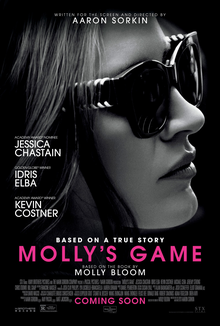
.jpg)

.jpg)









.png)


_poster.jpg)

.jpg)

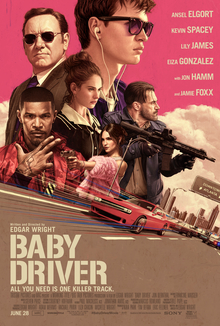
_poster.jpg)

.png)